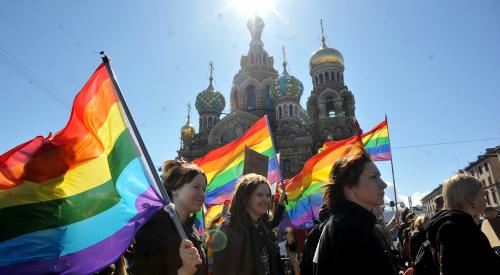- About
- Topics
- Picks
- Audio
- Story
- In-Depth
- Opinion
- News
- Donate
- Signup for our newsletterOur Editors' Best Picks.Send
Read, Debate: Engage.
| topic: | LGBT Rights |
|---|---|
| located: | Russia |
| editor: | Andrew Getto |
Want to get a quick showcase of how divided Russian society is? It’s simple: go do some grocery shopping.
Over 50 percent of Russians survive on about $370 per month. This poor, conservative majority frequents Magnit and Pyatyorochka: yellow tags, palm oil cheeses and rows of $2 vodka bottles.
The affluent 3 percent, who earn over $1,360 per month, prefer the squeaky clean Azbuka Vkusa and Globus Gourmet. German breads, prosciutto from San Marino, exotic fruit: these stores smell like money.
There is also a niche in between for a shrinking middle class, the majority of which lives in Moscow and St. Petersburg. And although there are a few big chains, nothing represents the urban middle class as accurately as Vkusvill.
The chain buys all its food directly from manufacturers across Russia and sells it under its own brand, from organic ice cream to cleaning supplies.
Like hundreds of thousands of people, I go there daily, and it has always been a great experience. It’s hard to explain what exactly is special there. If I had to try - it’s not gloomy, and not too fancy; everything just seems… normal. But a few days ago this feeling started to fade.
On 30 July, the last day of the Pride month, Vkusvill published a post as part of its ’Recipes of family happiness’ campaign. One of the families happened to be a queer one, consisting of four women: LGBTQ activist Yuma, her daughters Mila and Alina and Alina’s girlfriend Ksyusha. They’re all vegan, incredibly eco-conscious and look like balanced, happy individuals.
Up until that point, no corporation has ever publicly presented LGBTQ people in a positive or at least neutral light. This post was the first and only of its kind in Russian history, and the brand was extremely cautious; a long disclaimer read, “it would be a hypocrisy not to tell about real families of our clients,” labeled the post 18+ and warned the followers to consider all pros and cons before opening it.
Vkusvill’s core audience reacted remarkably well. Many of the liberal, middle-income Muscovites applauded the brand for its bravery in the middle of an ultra-conservative turn. But then Vkusvill’s social networks got flooded by an angry homophobic mob, who started to lambast the brand and issue death threats to the LGBTQ family.
Despite the fact that the crowd had not been following the brand before, the management decided to pull the post. But it was their explanation that caused real anger and disappointment.
The company apologised, saying the post was a mistake that “hurt feelings of many customers and staff,” and attributed that perceived mistake to a lack of professionalism of “certain employees.”
“The goal of our company is to give our customers an opportunity to get fresh and tasty products daily, not to publish articles, reflecting any political and social views. Becoming a source of discord and hatred was never our intention,” the statement read.
That sums up the situation perfectly. Recent amendments to the Russian constitution define family as a union of a man and a woman. The next logical step is painting an ordinary post about a happy but different family as something pursuing an evil political agenda and aiming to destroy Russian society. And the worst thing is that this was an act of self-censorship by the company, not an intervention by the state.
When the currently-jailed Russian opposition leader Alexei Navalny ran for President in 2018, his buzz phrase was “The Beautiful Russia of the Future,” which was supposed to come around after the fall of Putin’s regime. This is what going to buy some snacks in Vkusvill was like - a piece of a puzzle of a civil, humane Russia, which is yet to come. But by this summer the virus of ultra-conservatism has spreaded from state-run TV channels to your friendly neighborhood store.
Image: Rene Baker.

